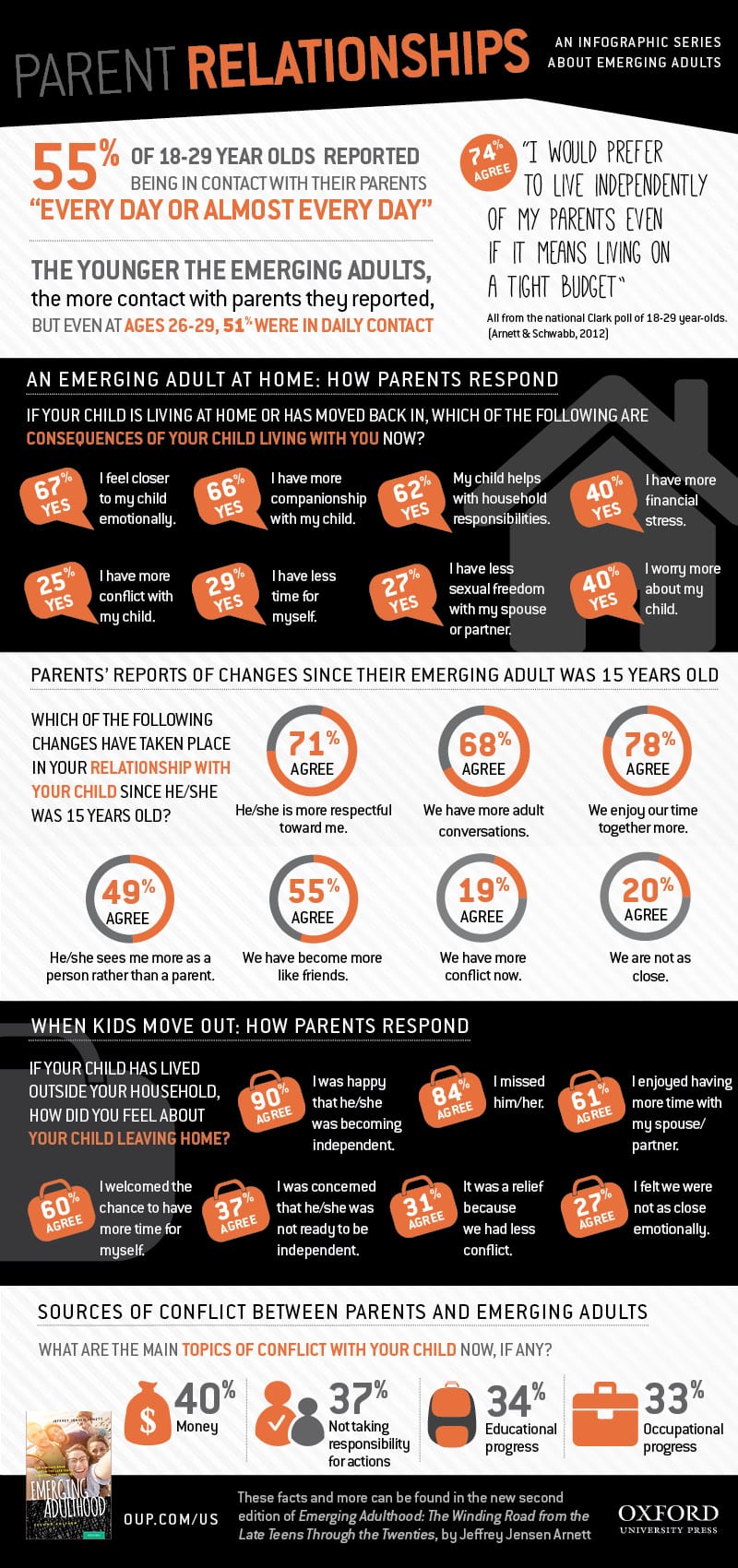No longer a teen.
He’s inbetween.
Oh, my.
When 30 is the new 20, you may be paying the cost!
Think for a moment about the lives of your grandparents and great-grandparents when they were in their twenties. How do their lives at that age compare to those of your children? What happened to change the twenties so much between their time and our own? And how should we understand the 18–25 age period today?
Emerging Adulthood: a new life stage extending from approximately ages 18 to 25, during which the foundation of an adult life is gradually constructed in love and work. Primary features include identity explorations, instability, focus on self-development, feeling incompletely adult, and a broad sense of possibilities.
Key thought: Changes in American life have created a new life stage–emerging adulthood. And when people in their 20s struggle, their parents may have to hold things together.
Practical Take-home: Remind them (and maybe yourself) that this is their life and they are responsible for how they live.

Click chart for more

Fifty years ago, most young people in these countries had entered stable adult roles in love and work by their late teens or early twenties. Relatively few people pursued education or training beyond secondary school, and, consequently, most young men were full-time workers by the end of their teens. Relatively few women worked in occupations outside the home, and the median marriage age for women in the United States and in most other industrialized countries in 1960 was around 20 (Arnett & Taber, 1994; Douglass, 2005). The median marriage age for men was around 22, and married couples usually had their first child about one year after their wedding day. All told, for most young people half a century ago, their teenage adolescence led quickly and directly to stable adult roles in love and work by their late teens or early twenties. These roles would form the structure of their adult lives for decades to come.
Now all that has changed. A higher proportion of young people than ever before—about 70% in the United States—pursue education and training beyond secondary school (National Center for Education Statistics, 2012). The early twenties are not a time of entering stable adult work but a time of immense job instability: In the United States, the average number of job changes from ages 20 to 29 is seven. The median age of entering marriage in the United States is now 27 for women and 29 for men (U.S. Bureau of the Census, 2011).
Perhaps the most distinctive characteristic of emerging adulthood is that it is the age of identity explorations. That is, it is an age when people explore various possibilities in love and work as they move toward making enduring choices. Through trying out these different possibilities, they develop a more definite identity, including an understanding of who they are, what their capabilities and limitations are, what their beliefs and values are, and how they fit into the society around them.
How does this apply to you?
When you were young, it was thought that identity was developed in adolescence. But that was more than 40 years ago, and today it is mainly in emerging adulthood that identity explorations take place
As emerging adults explore different possibilities in love and work, their lives are often unstable. A good illustration of this instability is their frequent moves from one residence to another. Rates of residential change in American society are much higher at ages 18 to 29 than at any other period of life. This reflects the explorations going on in emerging adults’ lives. Some move out of their parents’ household for the first time in their late teens to attend a residential college, whereas others move out simply to be independent. They may move again when they drop out of college or when they graduate. They may move to cohabit with a romantic partner, and then move out when the relationship ends. Some move to another part of the country or the world to study or work.
How might this affect you?
For nearly half of American emerging adults, residential change includes moving back in with their parents at least once
Most American emerging adults do not marry or have their first child until at least their late twenties. Emerging adulthood is a time between adolescents’ reliance on parents and adults’ long-term commitments in love and work. During these years, emerging adults focus on themselves as they develop the knowledge, skills, and self-understanding they will need for adult life. In the course of emerging adulthood, they learn to make independent decisions about everything from what to have for dinner to whether or not to get married.
How does this apply to you?
Your grandchild may be disconnected from her birth family. It is important to keep relationships with extended family and friends alive for her so that she is not cut off from everything and everyone she knew before the separation.
Emerging adulthood is an age of feeling in-between, not adolescent but not fully adult, either. When asked, “Do you feel that you have reached adulthood?” the majority of emerging adults respond neither yes nor no but with the ambiguous “in some ways yes, in some ways no.” It is only when people reach their late twenties and early thirties that a clear majority feels adult. Most emerging adults have the subjective feeling of being in a transitional period of life, on the way to adulthood but not there yet.
How does this apply to you?
It can be wildly frustrating if your child has a child and still lingers in this hazy stage of not-quite-adult.
Emerging adulthood is the age of possibilities, when many different futures remain possible, and when little about a person’s direction in life has been decided for certain. It tends to be an age of high hopes and great expectations, in part because few of their dreams have been tested in the fires of real life. Yet they are optimistic things will work out. In one national survey of 18- to 24-year-olds in the United States, nearly all—89%—agreed with the statement, “I am confident that one day I will get to where I want to be in life.”

The Biggest Challenge
Photo by Omar Lopez on Unsplash
What’s a Parent to Do?
An Expert offers 6 Tips to Consider
Elizabeth M. Klaers, MSW, LCSW, ACS
Practice Patience – Your emerging adult is in a transition and any transition requires patience. When we get impatient worry is usually lurking somewhere close by. Worry about their choices, worry about negative outcomes, worry about their wellbeing. Remind yourself that human beings learn through their direct experience. Every single thing they go through (good, bad and ugly) are stepping stones to help them gather, integrate and use important information that they’ll need now and as an adult.
Be Curious – You cannot possibly know exactly what your son or daughter’s path in life will include. Let yourself be curious and resist giving them all of the answers or expecting them to have all the answers. Ask more open ended questions (ones you do not already know the answer to). Being curious is hard because in order for it to be genuine, you must drop your own agenda.
Acknowledge the Facts – They are becoming more adult, which requires both freedoms and responsibilities. Acknowledge that your son or daughter is in a big transition and commit to moving towards the goal together. This may require more commitment to hanging out during times of “non-conflict” so conversations are mutual rather than in lecture style. Remind them (and maybe yourself) that this is their life and they are responsible for how they live. *If they live with you, rules should be simple, clear and direct – and yes, when your house rules are not honored, appropriate consequences will be necessary.
Accept that they are No Longer and Not Yet – Emerging adults are no longer an adolescent and not yet a fully mature adult. Turn toward this truth and hold it with gentle awareness. There may be some back and forth between closeness and distance. Emerging adults will often shift needs – one day being dependent, needing you there and another day being autonomous, needing distance from you. Like a young child that is moving from crawling to walking, even after mastering a couple of steps on their own, they will often drop back and reach for the coffee table or chair to help them along. What they mastered in the past is a familiar place to go as they try on and slowly integrate new behavior leading to lasting change.
Do your own work – Parental expectations and the expectations society has for families and children play a big part in the suffering we experience as parents. Although well intentioned – parents really want their kids to succeed and be happy – parental expectations are often unrealistic and come from parents’ own unlived dreams, fears or internal and external pressures. Parenting often requires we step back, reflect and explore the patterns and beliefs that are keeping us from accepting the goodness that is right in front of us. Learn set boundaries and how to transition more smoothly through this phase of life. Until a parent understands what is natural in the developmental process and how best to respond in their own unique situation, they may react out of fear and treat this phase as if it is an emergency.
Get your own life – Your kids may not be the only ones emerging. This is a big transition for the mothers and fathers. If this is your youngest or only ‘child’ the approaching empty nest may bring with it all kinds of reactions so, take care of you. Consider joining a book club, taking a class with your spouse or partner or having more frequent time with friends. If there are really big challenges you’re facing as a parent it may be tough to find the energy to make plans – try as best you can. Go out there and model what it means to be an adult – which includes taking care of yourself and having some fun!
For some parents this time of life is harder than anything else they have encountered. If you are struggling with prolonged depression and anxiety, or the ongoing family conflicts are affecting your relationships, consider psychotherapy. Be gentle with yourself and make sure you take time for self-care, whether on your own, as a couple or with family and friends.


DEEP DIVE
Wouldn't it be grand?
–Jeffery Jensen Arnett, Ph.D., Clark University

Ms Rosetti sounds like a handful as a young woman:
Christina was given to tantrums and fractious behavior, and she fought hard to subdue this passionate temper. Years later, counseling a niece subject to similar outbursts, the mature Christina looked back on the fire now stifled: “You must not imagine, my dear girl, that your Aunt was always the calm and sedate person you now behold. I, too, had a very passionate temper; but I learnt to control it. On one occasion, being rebuked by my dear Mother for some fault, I seized upon a pair of scissors, and ripped up my arm to vent my wrath. I have learnt since to control my feelings—and no doubt you will!”
–https://www.poetryfoundation.org/poets/christina-rossetti
Up-Hill
By Christina Rossetti
Does the road wind up-hill all the way?
Yes, to the very end.
Will the day’s journey take the whole long day?
From morn to night, my friend.
But is there for the night a resting-place?
A roof for when the slow dark hours begin.
May not the darkness hide it from my face?
You cannot miss that inn.
Shall I meet other wayfarers at night?
Those who have gone before.
Then must I knock, or call when just in sight?
They will not keep you standing at that door.
Shall I find comfort, travel-sore and weak?
Of labour you shall find the sum.
Will there be beds for me and all who seek?
Yea, beds for all who come.

